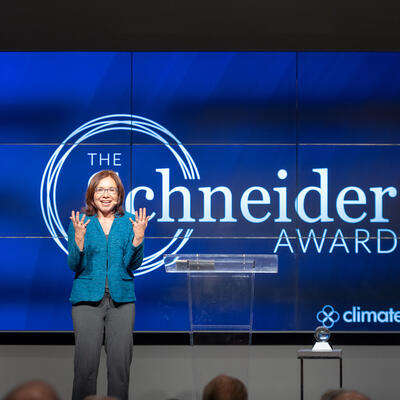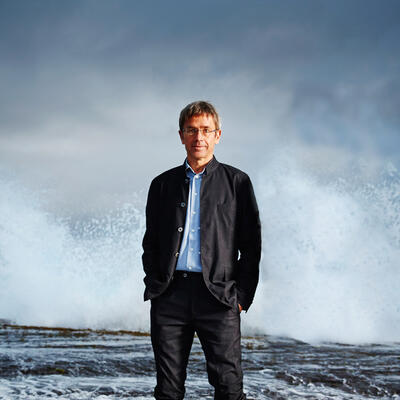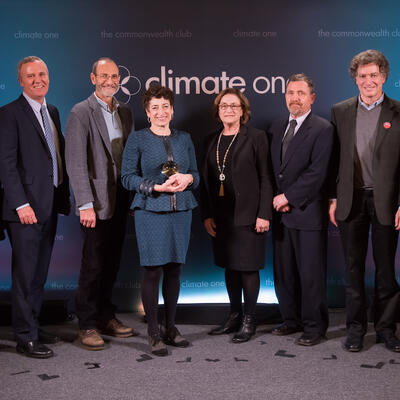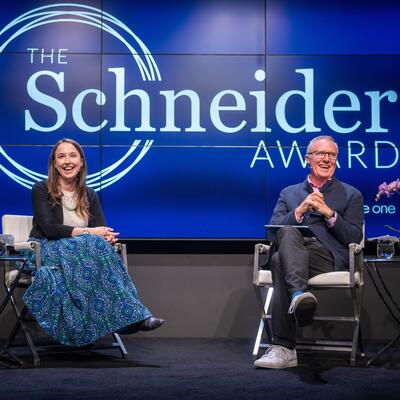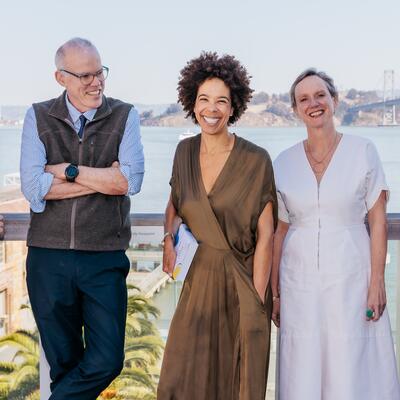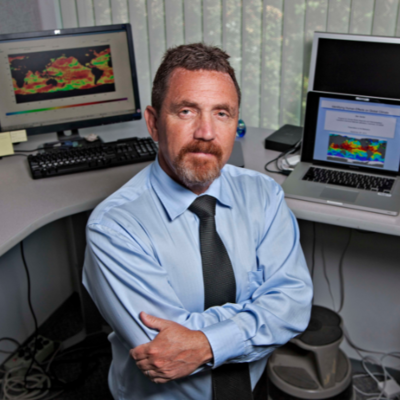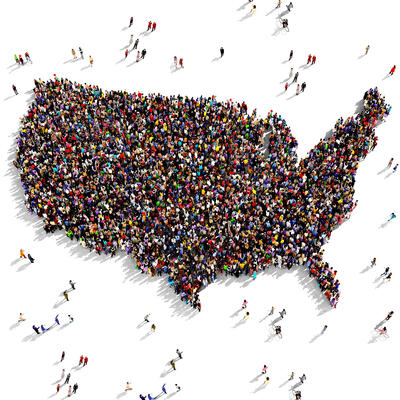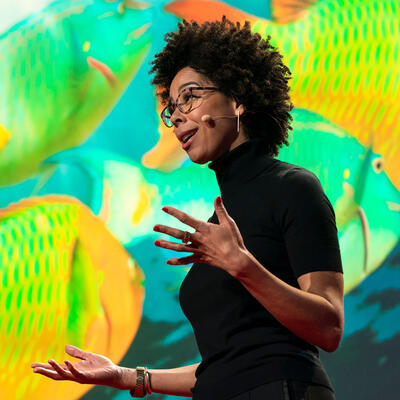
Ayana Elizabeth Johnson and Naomi Oreskes: The Schneider Award
Guests
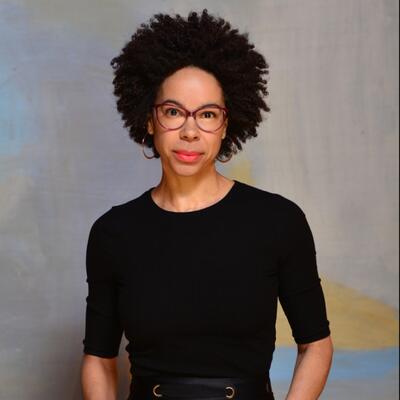
Ayana Elizabeth Johnson
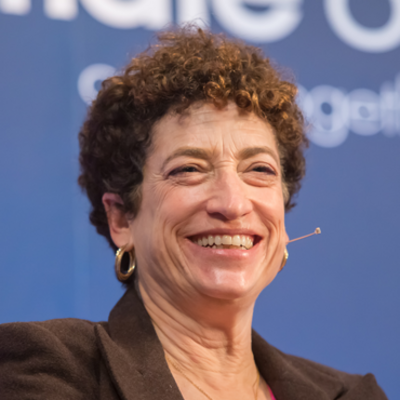
Naomi Oreskes
Summary
Established in honor of Dr. Stephen H. Schneider, one of the founding fathers of climatology, Climate One’s Schneider Award recognizes a natural or social scientist who has made extraordinary scientific contributions and communicated that knowledge to a broad public in a clear, compelling fashion. Past winners include Robert Bullard, Katharine Hayhoe, Jane Lubchenco, Michael Mann, and James Hansen, among others.
This year’s recipient is marine biologist, policy expert and writer Dr. Ayana Elizabeth Johnson. She’s co-founder of the Urban Ocean Lab and co-creator of the All We Can Save project.
In 2019, Johnson co-authored an op-ed piece highlighting what she calls the “Big Blue Gap” in the Green New Deal.
“I thought wow, [the Green New Deal] is really ambitious and exciting, but they left out the ocean and so it will not work. Because the ocean has absorbed 90-plus percent of the heat we've trapped with greenhouse gases. It's absorbed over about a third of the carbon dioxide we’ve emitted. It is buffering us from the impacts, it is providing all the solutions in terms of protecting shorelines and renewable energy,” Johnson says.
The idea caught the attention of Elizabeth Warren's presidential campaign, which then invited her to formalize it.
Johnson says when training as a scientist, she never aspired to or expected to be a public figure. “I always wanted to work at this intersection of science and policy. And so, for me it was just a matter of ‘how can I get this advanced degree in science in order to make sure that all the best science is used to inform policy-making,’ even if I'm not the one doing that science.”
In spite of the gravity of the challenge of addressing the climate crisis and the ongoing human suffering resulting from extreme weather events, Johnson says she wants to show that there is a place for everyone in this transformation.
“What gets me out of bed in the morning, what makes this work of communicating about climate science and policy so important, is that we have such a huge spectrum of possible futures available to us. And which one we get depends on what we do,” Johnson says.
Dr. Naomi Oreskes is the Henry Charles Lea Professor of the History of Science and Affiliated Professor of Earth and Planetary Sciences at Harvard University. She’s an internationally renowned earth scientist, historian, and past recipient of the Schneider Award. Her 2010 book with Erik M. Conway, Merchants of Doubt, focused on the decades-long campaigns by oil companies and political operatives to mislead the public and sow doubt on several scientific matters, including the ozone hole and global warming.
In 1981, as a young scientist, she was bluntly rejected for her dream job on the British Antarctic Survey explicitly because she was a woman. The reason? Because the geologists had to sleep in tents. “It was assumed that somehow a woman couldn’t sleep in a tent. And in fact, if anyone had to ask, I had slept in tents many times,” Oreskes says.
“Many people really don’t appreciate how widespread, how rampant and how cavalier the sexist rejection of women in science was until quite recently,” she says. “So it could be taken for granted that my application wouldn’t even be considered. And I graduated top of my class at one of the leading geology programs in the world.”
Oreskes says the field of science has evolved in a positive way for women in the intervening decades, though they still face unfair expectations, additional service work, and in some cases, an underlying bias that they aren’t as good as men.
So while there’s still work to be done, “I would encourage any young woman who feels that she has the aptitude to do science, the desire to do science, should absolutely do it,” she says.
Related Links:
The Stephen H. Schneider Award for Outstanding Climate Science Communication
Full Transcript
Greg Dalton: This is Climate One. I’m Greg Dalton. I’d like to hear your comments on the show, topics we should cover, and guest suggestions. You can reach me at greg@climateone.org. Today we’re honoring this year’s recipient of our award for excellence in science communication, marine biologist Dr. Ayana Elizabeth Johnson.
Ayana Elizabeth Johnson: What gets me out of bed in the morning, what makes this work of communicating about climate science and policy so important is that we have such a huge spectrum of possible futures available to us. And which one we get depends on what we do.
Greg Dalton: We’ll also talk with renowned earth scientist and historian Dr. Naomi Oreskes about how the field of science has changed for women during her career.
Naomi Oreskes: Many people really don’t appreciate how widespread, how rampant and how cavalier the sexist rejection of women in science was until quite recently, so it could be taken for granted that my application wouldn’t even be considered. And I graduated top of my class at one of the leading geology programs in the world. (:20)
Greg Dalton: Ayana Elizabeth Johnson and Naomi Oreskes: Up next on Climate One.
Greg Dalton: This is Climate One, I’m Greg Dalton. Today we’re honoring the recipient of an award we give out each year to an accomplished climate scientist and communicator. Established in honor of Dr. Stephen H. Schneider, one of the founding fathers of climatology, Climate One’s Schneider Award recognizes a natural or social scientist who has made extraordinary scientific contributions and communicated that knowledge to a broad public in a clear, compelling fashion. Past winners include Robert Bullard, Katharine Hayhoe, Jane Lubchenco, Michael Mann, and James Hansen, among others. This year’s recipient is marine biologist, policy expert and writer Dr. Ayana Elizabeth Johnson. She’s co-founder of the Urban Ocean Lab and co-creator of the The All We Can Save Project. In 2019, Johnson floated the idea of a Blue New Deal in an op-ed piece. The idea caught the attention of Elizabeth Warren's presidential campaign, which then invited her to formalize it. Johnson says this is the piece of climate communication she’s most proud of, though she speaks about it infrequently now.
Ayana Elizabeth Johnson: The idea came to be just over a lunch with Chad Nelsen who’s is the CEO of Surfrider. We were both talking about having read the Green New Deal resolution and you get to page 10 or 11 out of 14. For those who haven't read it it is short it is double spaced and large font it’ll take you like five or 10 minutes. And I thought wow this is really ambitious and exciting, but they left out the ocean and so it will not work. Because the ocean has absorbed 90+ percent of the heat we've trapped with greenhouse gases, right. It's absorbed over about a third of the carbon dioxide we’ve emitted. It is buffering us from the impacts it is providing all the solutions in terms of protecting shorelines and renewable energy. And so, we leave out the ocean then we’re leaving out what a report that came out earlier this year calculated about 20% of the climate solutions available to us. And so, Chad Nelsen and I thought well how can we help to make sure the ocean is included and then we ended up connecting with Bren Smith who is a regenerative ocean farmer who cofounded a nonprofit called GreenWave, who was also working on the same concept and the three of us put our heads together for that op-ed in grist, called the Big Blue Gap in the Green New Deal. And that sort of became a policy memo with data for progress and that caught the eye of the Warren campaign and then with Maggie Thomas who was her climate advisor who is now chief of staff in the White House on climate working with Gina McCarthy. She and I led the effort to craft that policy plan, which is something you know that those ideas keep moving forward. And that's something that I'm working on now through Urban Ocean Lab, the policy think tank that I cofounded. So, I think being able to interject the ocean into the climate narrative is something that I'm always trying to do; that is the core if my scientific training. So, just consistently raising my hand and saying hey, don’t forget about the ocean when we’re talking about climate solutions and climate policy.
Greg Dalton: Right. And I think without the oceans there be some mind-blowing amount of surface temperature warming --
Ayana Elizabeth Johnson: Like 97° hotter or something like that.
Greg Dalton: I can't even imagine. So, the Biden administration has proposed 30 x 30 conserving 30% of land 30% of oceans. But as you just said ocean seemed often get left out it tends to be land centric. So, are they doing in terms of balancing the oceans and the lands with the oceans often overlooked?
Ayana Elizabeth Johnson: So, the United States actually has quite a large percentage of its exclusive economic zone the waters that we have jurisdiction over in protection. The exact percentage just slip in me but it’s actually you know over 15 maybe 20% something like this but it's mostly very remote areas. So, it's the Northwest Hawaiian Islands, right. It is these faraway places where there aren’t a lot of people where there is not a lot of extraction happening. And so, what I would like to see when we think about this goal of protecting 30% of nature by 2030, is that we’re also protecting nature near where people live. It wasn't until the last few years that there was any sort of significant protection in the Northeast United States waters, right, until we had the Northeast Seamounts and Canyons National Monument created. And so, I think there's a lot of work to do in terms of making sure we have representative proportions of each ecosystem protected, not just faraway places that people will never get a chance to visit and which are in many ways de facto protected. So, that's kind of what I'm looking at and going to be advocating for when it comes to establishing more protected areas in the United States, not just 30% overall but 30% of each ecosystem type as well.
Greg Dalton: They’re the ones that are more at risk. More than 120 million people live in coastal counties in the United States. How will climate disruption impact the lives of those people? Is that mainly a story of risk loss and grief?
Ayana Elizabeth Johnson: That’s a very well put question and I think the grief part absolutely. I have a friend who reminds me that in part what we need to do to deal with the climate crisis is grieve, is mourn the things that are lost that are being lost so that we can only metabolize what's happening and then move on because we don't really have the cultural norms or traditions for saying goodbye to things that are being lost because of climate change. And so, we need to think about how do we as a culture create the new traditions that we need, the ceremonies and some sense that we need. Because you know the place where you learn to swim, the place where you went fishing with your father, the place where you had your first kiss or learn to ride a bike might all be underwater or those ecosystems might be unrecognizable from what they were a few decades ago, if not already. So, figuring out how to deal with that much change emotionally and culturally is something that I do not feel equipped to lead on, but I know a lot of people are helping us think through that. But your broader question I think this term of coastal elite is a real pain in the butt because as you described about 40% of Americans live in coastal counties. About 30% live in coastal cities, which is why the work of Urban Ocean Lab is focused on how to do we make policy change in coastal cities because it's not an elite issue it is one in three or you know four in 10 Americans depending on how, you know, sort of which geographic scope you're using to think about that. So, figuring out what are the policy changes that we need to deal with the extreme weather events that we’re already seeing and which will you know become more frequent is absolutely a critical need and there's so much that we can do. I just want to be clear that I've been talking a lot about of how bad things are and all of that is true but what gets me out of bed in the morning what makes this work of communicating about climate science and policy so important is that we have such a huge spectrum of possible futures available to us. And those really depend, which one we get depends on what we do, right. We’re not gonna have a pristine planet with 8 billion people living on it and all of the changes that have already happened but we could have like a really, really terrible future or we could have like an actually pretty good and interesting one. I often get pegged as being an optimist or somebody that’s really hopeful. And those are titles that I actually don't relate to at all because both of those words have in their definition that you expect a good outcome. I've no expectation or assumption that the outcome for humanity is necessarily going to be good. But I know that it could be much better than it would otherwise be if we sort of get our act together and move with immense speed and welcome as many people as possible into this work and show people that there really is a place for everyone in this transformation.
Greg Dalton: Marine protected areas are sometimes pointed to as like when people get out of the way nature comes back quickly. What’s a positive story you can point to because it’s one thing to say good things can happen in the future if we choose this path? But what good things have already happened that you can be little more specific you can point to and say, ah, this is possible let’s do more of these.
Ayana Elizabeth Johnson: So, absolutely marine protected areas is one. And Dr. Jane Lubchenco who is a previous winner of this award probably can rattle off these facts more eloquently and robustly than I can at this point it's been a while, but you have like several hundred percent increase in fish biomass for example, within you know five or 10 years of establishing a marine protected area in place. If we leave nature alone if we give it a break. It can in fact replenish itself. If we just figure out how to back off a little bit. And so, those kinds of things are very exciting to know about. I think just absolutely the resilience of nature is a major source of inspiration for me. And lately I've been reading this new book called Required Reading and the subtitle is Climate Justice, Adaptation, and Investing in Indigenous Power. It's right here on my desk. And it's an anthology of essays by indigenous leaders who are working on climate solutions who are working on the cultural and policy and community level transformations that we need. I keep using that word transformation because that's the only way I can think about the magnitude of change that's really needed. And I'm finding this book to be incredibly inspiring because so often we do our land acknowledgement we talk about the value of indigenous wisdom in addressing environmental issues, but it's something that I think not very many of us actually read about and study that wisdom in any detail. And so, it's something that I have started to dedicate more of my time to. And overall the answer to your question is I don't know. And that's actually the next project that I'm working on is I'm writing a book with the tentative title of What If We Get It Right. Because I feel like it is so important for us to know what we are running towards, what all this work will get us if we do charge ahead with the transformations around electricity and transportation and buildings and manufacturing and agricultural and land use, what do we get? Show me that it’s worth it. Show me that there's a place for me in this future. Show me that the work can be joyful and exciting along the way. And so, that's what I am working to put together now.
Greg Dalton: You are the recipient of the Climate One Award in memory of Stephen Schneider, a pioneering climate scientist whose last book was Science as a Contact Sport. Did you know science was going to be a contact sport when you started to pursue a PhD in marine biology? Did you anticipate how rough it would be?
Ayana Elizabeth Johnson: No. But I also did not anticipate in any sense the role that I would end up playing. I never aspired to or expected to be any sort of public figure. My first --
Greg Dalton: Lots of scientists don’t. That’s not why people go into science, right.
Ayana Elizabeth Johnson: Exactly.
Greg Dalton: You wanna be in your lab and do your work.
Ayana Elizabeth Johnson: I also never thought I would be in the lab. So, my first job out of college was working in the policy office at the Environmental Protection Agency in DC. My major as an undergrad with environmental science and public policy. So, I always wanted to work at this intersection of science and policy. And so, for me it was just a matter of how can I get this advanced degree in science in order to make sure that all the best science is used to inform policy making even if I'm not the one doing that science, I will have the training to be able to interpret it and convey the importance of it in the context of how we form policy. And so, I guess the answer is no but because I never thought of myself really as having a career as a research scientist and I never thought of myself as having a public profile in any significant way. I thought I would just like be a policy wonk who had a bunch of science training that made me useful in a different way. Because some of the best advice I ever got was and there are a lot of lawyers doing policy there aren't as many scientists doing policy that I could help build the bridge from the other direction. So, I kind of thought I would stay out of the fray.
Greg Dalton: You’re listening to a Climate One conversation with this year’s winner of the Schneider Award for climate communication. Coming up, broadening who’s involved in creating effective climate solutions:
Ayana Elizabeth Johnson: If we need these transformations in every community all over the world, we need leaders who can lead their communities and that means we need a broad diversity of leaders, we need a lot of ideas at the table.
Greg Dalton: That’s up next, when Climate One continues.
Greg Dalton: This is Climate One. I’m Greg Dalton. We’re talking with noted climate scientist, policy expert and writer Ayana Elizabeth Johnson, the recipient of Climate One’s Stephen Schneider Award for climate communication. These days it feels like extreme weather is bringing the climate emergency home almost every week--with severe floods, hurricanes, wind storms and wildfires. I asked Johnson how that increased sense of urgency affects her and her work.
Ayana Elizabeth Johnson: I feel very lucky that my brain chemistry doesn't tend towards anxiety and depression. That is just a luck of the draw of how I was constructed at birth. And I know that it’s much harder to do this work if you’re more susceptible to those things. And so, I'm really grateful that I have a mind that tends towards, it's really bad; what do we gonna do who’s the team what’s the strategy let me make a checklist like let me just chip away at this is my immediate instinct when faced with even a problem of the magnitude of the climate crisis. But even I am stopped in my tracks by the horrors in the news, right, because we’re seeing the impacts of climate change all around us on a day-to-day basis now. We’re seeing how people's lives and livelihoods and cultures and communities are at such extreme risk. And I’m not a robot right. I feel those things and I feel them in a way that I think is different from a lot of people. We hear so often that what we need in climate communication is more compelling storytelling, more narratives about people and how individuals are impacted and dealing with this and how individuals are working on solutions. But I think in part because of my training as a scientist while I value that kind of journalism and communications work. The stuff that hits me the hardest is actually the graphs. I read the United Nations report on oceans and cryosphere and I looked at the graphs of the scientific projections of sea level rise and ocean temperature and ecosystems and sea ice and all of these things. And I was on the New York City subway a few years ago perking out reading it, and I was crying in public because I knew what those numbers meant and I had the same experience just a month ago writing an essay on the ways in which the ocean has been impacted by climate change, even though I'd known for a long time about ocean acidification about the risk to coastal ecosystems like coral reefs, which I studied for my PhD about how coastal ecosystems are such an important buffer for the impacts of climate change for coastal communities and how sea level rise affecting people and hurricanes. All that stuff is not new to me but having to go back into the scientific literature read the peer-reviewed studies to make sure I was including the most up-to-date statistics that barrage of scientific details about exactly how bad it is what really just far mold my spirit for a few weeks there. And so, the thing for me is always thinking about how do we sort of race through the bad stuff I mean acknowledge and absorb just how high the stakes are so that we can know that we are grounded in that reality in order to move forward. But then I instantly want to switch from okay it's bad it's worse than we can imagine it's coming faster than we thought. But who does what and how quickly can we make this transformation from a fossil fueled and extractive economy to a more regenerative one?
Greg Dalton: In an article you wrote in 2020 in the Washington Post you said, I’m a black climate expert racism derails our efforts to save the planet. In it you quote Toni Morrison saying “The very serious function of racism is distraction; it keeps you from doing your work. It keeps you explaining over and over again your reason for being." And I get that and so, part of me doesn't want to ask you about this and yet I feel an obligation to do so as a white guy with a show. Can we spend a little bit of time talking about that and in that piece about superficial task and the need to do deeper work.
Ayana Elizabeth Johnson: I guess the thing that I wish more people understood at this intersection of race and climate is that people of color already care and get it. In fact, are more concerned about climate than their white counterparts in the US. And we have to thank for this knowledge the last year's recipients of this very award Dr. Leiserowitz, and Dr. Maibach whose research whose polling of Americans shows us that it's about 49% of white Americans who are concerned about climate change, 57% of black Americans and about 70% of Latinx Americans. So, when we think about how are we going to address this crisis. It's how do we build the biggest strongest team. And so, how do we then welcome in the people who already get it, who already care, who are already disproportionately more likely to want to be a part of the solutions to want their elected representatives to be more active on pushing forward climate legislation who are more likely to volunteer who are more likely to call their members of Congress. And to me one of the most important findings of their research and polling is that it's not just because communities of color are more heavily impacted by climate change and extreme weather events that are fueled by climate change. That’s what we think we think it's because they're getting pummeled and they see it more viscerally that they are more concerned. And the answer is actually that especially for Latinx communities in the US it’s because they have a more egalitarian worldview. It’s because they have the sense of needing to be a part of the solution of this responsibility to your community as opposed to a more individualistic worldview which tends to be what more of the white people have in America in terms of this context around climate. And so, I think there's a really important lesson there that it's not just about climate justice in terms of who is the most heavily impacted, which is where we normally focus our efforts on all the injustices associated with climate change and it's absolutely critical to address those and make sure those do not become more extreme and in fact are reversed. But it's also really important to think about who do we need at the table if we’re gonna work on solutions effectively. If we need these transformations in every community all over the world who’s gonna be leading those transformations in every sector in every town in every part of our economy in every corporation in every level of government. And so, we need leaders who can lead their communities and that means we need a broad diversity of leaders. We need a lot of ideas at the table. And when I say diversity I don't just mean racial diversity I mean age diversity I mean gender diversity I mean geographic diversity. Diversity in areas of expertise, diversity in ways that we think and approach problems. And so, a lot of the work that I do in terms of climate communication really aims to say like you are welcome in this work, you are needed in this work, let's think about where you will fit in, people who maybe didn't think there was a place for them before.
Greg Dalton: Yeah, welcoming rather than kind of guilt or other way coming into it. As cofounder of the All We Can Save Project you focus on nurturing a climate community rooted in the work and wisdom of women. We have an episode titled The Feminist Climate Renaissance that features you, your coeditor Katharine Wilkinson and four women featured in that book. For those who haven't heard that show, how was the work and wisdom of women, particularly BIPOC women different from white men so needed and what we need on climate now.
Ayana Elizabeth Johnson: So, Katharine and I were inspired to create this anthology because we were just so frustrated with seeing you know who was controlling the narrative, who had the mics, who have the financial resources to do their work. And in the US, it was largely white man controlling what we think of as you know, who we see when we think about climate who are the leaders --
Greg Dalton: Steve Schneiders of the world, right. This award may be perpetuating that.
Ayana Elizabeth Johnson: I actually think I don't think of that as a problem. I mean, I'm so honored to be following in his footsteps and the footsteps of all who have received this award before me. I was like literally jaw-dropped gobsmacked to be in this company. So, it's not about pushing aside the leadership of white men. It's about having more leaders, right. What we need is a leaderful movement as black lives matter sort of thinks about it. We need just more leaders as well as different leaders. And the way that Katharine and I sort of framed that in the opening essay of All We Can Save was to identify a few key features of the leadership that we were seeing of women that was different and remarkable and important and worth uplifting. And of course they’re characteristics that anyone can embody and so it's this clear focus on making change rather than being in charge, right. It’s the shift in the ego. It's the commitment to responding to the crisis in ways that heal systemic injustices rather than keeping them. It's this appreciation for heart-centered not only head-centered leadership and integrating the two. And it's the recognition that building community is a requisite for building a better world that we’re in this together, that this is not about a hero that this is not about yelling the most facts or having the best science. It's about how we actually implement the solutions in a way that work for people. And I know implementation is not maybe like the sexiest word but for me it's like extremely exciting because we have most of the solutions we need and the question is like, how are we going to make them all happen in the world.
Greg Dalton: Dr. Ayana Elizabeth Johnson is a marine biologist, policy expert and writer. She’s co-founder of Urban Ocean Lab and co-creator of the The All We Can Save Project, and this year’s winner of Climate One’s Stephen Schneider Award for outstanding climate communication. Dr. Naomi Oreskes is Professor of the History of Science at Harvard University. She’s an internationally renowned earth scientist and past recipient of the Schneider Award. Her 2010 book with Erik Conway, Merchants of Doubt, focused on the decades-long campaigns by oil companies and political operatives to mislead the public and sow doubt on several scientific matters, including the ozone hole and global warming.
Greg Dalton: Recently, CEOs of six major oil companies testified before the House oversight committee about their role in misinformation about climate science. I asked Naomi Oreskes to respond to two clips from that hearing: First, Michael Wirth, CEO of Chevron.
[Start Playback]
Michael Wirth: We accept the scientific consensus. Climate change is real, and the use of fossil fuels contributes to it. We are committed to helping address this challenge. I also want to address directly concerned expressed by some those calling for today’s hearing. While our views on climate change have developed over time, any suggestion that Chevron is engaged in an effort to disinformation and mislead the public on these complex issues is simply wrong.
[End Playback]
Greg Dalton: And next Congressman Ro Khanna.
[Start Playback]
Ro Khanna: I don't believe you purposely want to be out there spreading climate disinformation. But you’re funding these groups and they're really having an impact, you know, they’re spending millions of dollars in Congress to kill electric vehicles. And they’re spending millions of dollars against the methane gas. And you can do something here. You can tell them to knock it off for the sake of the planet. You could end it. You could end that lobbying. Would any of you take the opportunity to look at API and say stop it. Any of you?
[End Playback]
Greg Dalton: API of course the American Petroleum Institute. Naomi Oreskes, what’s your reaction when you hear those two clips from those congressional hearings?
Naomi Oreskes: Well, I’d say my main reaction is I get a little bit of heartburn. Because it’s so much consistent with the pattern we've seen for such a long time of the kind of careful parsing of words to avoid really taking responsibility for what they've done. So, if you notice when the Chevron CEO spoke, he said any suggestion that Chevron is engaged using the present tense. Okay, well, I don't know what Chevron is doing at this very moment because you know they don't open their books to me, but we certainly know that Chevron and Exxon Mobil and BP and Shell and all of the major fossil fuel corporations were for many years highly engaged in a process of confusing the public through half-truths, disinformation, cherry-picking data that that went on for decades, and that has been documented by me, by investigative journalists from the Los Angeles Times and elsewhere. So, it is proven beyond any reasonable doubt that Chevron was engaged in those activities. Activities which they have never apologized for, never acknowledged, never disassociated themselves from. And the second question about API then follows directly on the heels of that problem. So, even today we know that one of the strategies that corporations like Chevron and Exxon Mobil use is not necessary to be engaged in disinformation themselves but to do it through third-party allies. And this is a pattern that they have followed that was established by the tobacco industry. We have many, many thousands, hundreds of thousands and millions of pages of documents about the tobacco playbook. The use of third-party party allies was a key strategy to make it seem as if the industry itself had its hands clean while it let someone else do the dirty work on their behalf. We have clearly seen this with API and Congressman Khanna was inviting them to say, you know, we don't have to do that, we could stop. API is the fossil fuel industry; it's not like API is somehow independent and autonomous of the petroleum industries that it represents. And as we heard not one of them would take up the Congressman's request. I also wanted to say one other thing about the parsing of words. We heard many times during the congressional hearings, CEOs say we acknowledge that climate change is real and that fossil fuels “contribute” to it. We heard that line used many, many times during the course of the day. And this is a beautiful example. It's almost, I mean sometimes I wish I were a professor of rhetoric so I could use these examples in my classes. Like this is incredibly skillful rhetoric to say that fossil fuels contribute to it implies that there are many other causes as well. But that's just not true. The IPCC has said repeatedly and clearly that the observed warming of the planet is caused by greenhouse gases increased greenhouse gases probably 90 I think they cited last time was 98% of the observed warming is being driven by the increase in greenhouse gases. And about 60% of that comes from fossil fuels. So, fossil fuel combustion is the primary cause of climate change, it doesn't just contribute to it. And that repeated refrain of contribute, contribute…it’s so frustrating because it is in a way dishonest, right? It’s representing their product as just one of many causes as opposed to the primary driving cause.
Greg Dalton: Right. Very skillful use of rhetoric and present tense. And it’s also they also there’s an implication that they’re not denying the basic science but they have done things such as campaigns aimed at people saying that green energy will take your job and there's other ways it's not sort of a head-on assault on science but still creating anxiety and fear about the solutions or taking action because that means that, oh I might, you know, solar is gonna take my job away. So, there's some very nuanced ways they chip at it where it’s not a direct assault on science.
Naomi Oreskes: Although I wanna just jump in there. I totally agree with what you said but I wanna say that actually it is a direct assault on science. To say that fossil fuels contribute to climate change is an assault on science when science proves.
Greg Dalton: Oh, sure. Yeah.
Naomi Oreskes: So, when they say, oh we accept the science but actually they don’t actually accept the science because they continue to misrepresent the scientific findings through this very careful, rhetorical parsing of words.
Greg Dalton: So, in the tobacco case there was very famously, you know, boxes of documents that landed on doorsteps. If you saw the insider with Russell Crowe and Al Pacino that portrayed, yeah, there’s a lot of smoking gun so to speak and a paper trail. That was before email. What do we know about the oil industry and what kind of smoking guns or documentary trail might we see from these congressional hearings?
Naomi Oreskes: We already have a very substantial paper trail going up to about 10 years ago. We don't have as much about the more recent period because it usually takes time for documents to make their way into archives. And so, I think a lot of industry obfuscation and blowing smoke if I may use that metaphor has to do with what the industry is doing right now today. And that's why you keep hearing the executives using the present tense any allegation that Chevron is engaged. Well, it is much harder for us to know exactly what they are doing today but we see the advertisements that they do. There's been a flood of advertisements on social media in the last few months. There's the well-documented social media campaign by BP to promote the idea that climate change is largely the result of our own personal carbon footprints as opposed to the decisions made by industry executives. So, we don't know as much about the most recent period. We don't know about the industry's thinking behind those ad campaigns. And so, partly what Representative Khanna has been trying to get out with his own document requests is to get a clear picture to have more transparency about what this industry has been doing.
Greg Dalton: And there’s also been an evolution of straight out denial, it's not happening to more sort of delay dismissed. So, it's gone from it's not happening to we’re not sure to oh we can’t do much about it, to, it’s China’s fault or technology will solve it. I think of it sometimes a little bit like COVID, you know, there are kinds of mutations and that’s how evolution works, right. Their messaging is often evolving and mutating in very subtle ways.
Naomi Oreskes: That’s right. And again, we know that the fossil fuel industry hires smart and talented public relations firms. They hire smart and talented advertising firms and they are, in their advertising, very responsive to public perception. If only they were as responsive in their actual actions. So, I think you're right once it became to a point where nobody can really say that climate change wasn't happening you couldn’t say that with a straight face when the American people could see the results of climate change in front of our own eyes as California was burning, as Texas was flooding, as hurricanes were destroying communities. It became harder to say that with a straight face. And so, we did see a shift to strategies of delay well, we can't rush, you know, we have to think this through we have to be judicious, you hear that a lot. And also, what my research associate Geoffrey Supran and I have called the fossil fuels savior framework. That actually the industry will save us. The industry that caused this problem, we should now trust them because after all they're doing all this great stuff. So, many of us have seen for example, the advertising campaign that Exxon Mobil rendered in the Olympics where they spoke a lot and promoted their algae biofuel program. Well, algae biofuels is a good thing. I'm in favor of that. But it’s a tiny, tiny percentage of the actual efforts of this industry. There have been a number of studies which have shown that the total amount of effort that the fossil fuel industry is putting into renewable energy and genuinely green initiatives is less than 2% and, in some cases, probably less than .2%. It’s this tiny sliver but the ads would make you think that they have really pivoted to a new model which they have not. If you actually read their annual reports, which I've done or you even listen to what they said in those hearings which I also did. They are very clear. Their plan is to continue exploring for still more oil and gas and to continue to develop those fields which means continuing to produce climate damaging fossil fuels for the foreseeable future well into the 2050 and beyond. And if you paid any attention to the scientific reports at all you know that that is not compatible with preventing dangerous anthropogenic interference in the climate system, otherwise known as the 2° threshold. So, these companies say that they accept the Paris Accords, but their actions are completely at odds with that.
Greg Dalton: You're listening to a conversation about science and climate communication. Coming up, the danger of talking about climate “risk” as opposed to reality:
Naomi Oreskes: It’s another form of strategic rhetoric to make us think the problem is somehow less severe or less certain than we know for a fact that it is.
Greg Dalton: That’s up next, when Climate One continues.
Greg Dalton: Let’s get back to my conversation with earth scientist, author, and professor Naomi Oreskes. She’s written that quote, “the rhetoric of climate risk downplays the reality and seriousness of climate change." She explains that the word “risk” isn’t intrinsically misleading, except if you use it to talk about things that are already happening.
Naomi Oreskes: So, the word risk implies something that may or may not happen. It's a hazard, it's a potential threat. It's something that could happen. So, if I ride a motorcycle without a helmet, that's risky. If I rock climb without good equipment, that's risky. But I might not get hurt, I might get hurt, I might not. It depends. But in the case of climate change, climate change is no longer a risk. The irony is that if Exxon Mobil had spoken of it as a risk back in the 1970s then I would agree I’d say, yeah, in the 70s it was a risk. That’s what scientists were saying. They didn’t think it was happening yet but they believed that it was a future threat, it was a risk and that it almost certainly would happen sooner or later, but they weren't exactly sure when. So, the irony is that when it really was a risk Exxon Mobil didn't talk about the risk. But when it actually became a reality that’s when they started calling it a risk. So, you see again this kind of subtle and clever use of language. Climate change is a reality. We already know that the globe has warmed up more than 1° C. We know from detection attribution studies that that warming has made a number of extreme weather events worse and we can even point to specific extreme weather events, specific fires, droughts, floods and hurricanes that have almost certainly been made worse by climate change. And these extreme weather events have destroyed people's homes, they have caused billions and billions of dollars in damages that the taxpayer picks up the bill for and they have killed people. So, this is not a risk. And yet, the industry keeps talking about risk, risk, risk, risk, risk. And so, it’s another form of strategic rhetoric to make us think the problem is somehow less severe or less certain than we know for a fact that it is.
Greg Dalton: Exxon Mobil has accused you and your co-author of having a conflict of interest because you did a few hours, 3.5 hours of work for a law firm that is suing them. How have such attacks on your character affected you personally and how do you respond to that?
Naomi Oreskes: Well, first of all I wanna say this is classic projection. So, obviously the group here with the giant multibillion-dollar conflict of interest is Exxon Mobil. They have a business model that is counting on continual damage to the climate system and counting on exporting the cost of that damage on to the rest of us. But in terms of how it affects me, look, nobody wants to be attacked, nobody likes to be called names. But my own view is that the fact that Exxon Mobil feels compelled to attack me is basically a sign that I’m doing something right. I'm telling the truth and sometimes the truth hurts. And, you know, one of the hardest things in the world is to be able to say, yeah, we made a mistake and we want to try and find a way to fix it. And particularly, you know, I'm sure Exxon Mobil is frankly probably terrified of the potential legal liabilities that they face and they probably have an army of lawyers telling them that they can't admit in public that they are responsible for billions of dollars in damage from extreme weather events. So, it doesn't surprise me that they respond the way they do, but I think it's really, really sad because they have an opportunity to lead, they like to think of themselves as leaders, they always talk about how they are industry leaders. There's a real opportunity here to do something different, to do the right thing and they are smart enough to know that and the fact that they refuse is to me really just well it's a tragedy of genuinely planetary proportions.
Greg Dalton: Right. They are science-based organizations. They have a lot of capital, they have a lot of capacity if they could use that in direction of that, I’m sure you’ve seen the Shell Climate of Concern video from about 1990 spells it all out very clearly, they talk about greenhouse gas refugees and we’re seeing that. It’s like I hadn’t heard that term but Shell was using the term in their own corporate videos in 1990 greenhouse gas refugees and laid out everything that we’ve seen. So, they knew.
Naomi Oreskes: Exactly. So, this isn’t about me, this is about the seven billion people on this planet who are affected by climate change.
Greg Dalton: What do you think about the primary role of science as we’ve seen scientists kind of getting into activism. There was a march for science a few years ago. Some scientists in Glasgow were engaging in civil disobedience. I think some were getting arrested. How do you think about the primary role of scientists at this intersection of truth and policy and climate disruption?
Naomi Oreskes: Well, it’s a tricky moment for scientists. Most scientists just want to do science. They go into science as I myself did because they were curious about the natural world, because they found scientific research gratifying. It’s really great to do work where you feel like through your work there are some pieces of the planet that we understand better than we did before. And most scientists that's what they're trained to do, it's what they're good at. And many scientists are not necessarily comfortable in a more public role. That said, one of the things I've learned through my own work is that one of the primary obstacles to public engagement for scientists is the perception that they will be viewed as overstepping the bounds they’ll be viewed as crossing some line that define scientific objectivity and that they won't be viewed as objective or credible if they become involved as a public voice. And the really interesting thing about that is that the data don't support that. And it’s so interesting to me that scientists who are in their scientific work so data-driven, often have views of action very unscientific when it comes to how people view them what we know about social change. So, we don’t have a lot of good data on this but I've been doing some research with wonderful graduate students now postdoc Victoria Colonia and she's actually done surveys of people asking people this very question. Do you think scientists should have a public voice on these questions? Do you think a scientist is less credible if they have a public voice? And by and large the evidence says that people do think that scientists should speak up and they don't think that it undermines their objectivity. And the way I understand this is through something that my colleagues and I have called epistemic proximity. That if you think about a problem like climate change no one understands it better than scientists. Scientists were at the frontline of what climate change is and why it matters. And so, they have potentially tremendous credibility to speak in public about why this issue is so important, how it affects our lives. And I think that when scientists embrace that role, they can do it incredibly effectively. And we've seen that particularly with the previous winners of this prize, people like Mike Mann and Ben Santer and Jane Lubchenco and Katharine Hayhoe. They are incredibly powerful voices because they both understand the science and they get why it matters. And when they're willing to speak to that in public in a way that is both scientific and personal at the same time it’s an incredibly powerful mix. So, my message to scientists is if you don't feel comfortable doing this and you just want to do your science. That's okay. That's your job, and that's what you're trained to do. But if you are willing to try, the world really needs you to do this. The world wants you to do this and there’s a good chance with a little bit of effort you could in fact be a powerful voice.
Greg Dalton: And there’s a tendency in these conversations to think of the physical sciences, natural sciences, chemistry, physics, atmospheric sciences, I would just lift up that there’s also the behavioral and social scientists. Because for me, the cognitive science is how we process language and risk and respond to facts and emotions, that’s also very important part of our understanding of why humans are not doing more and how we perceive threats and that sort of thing. So, it's those brain and cognitive sciences as well as the other kinds of sciences.
Naomi Oreskes: Absolutely. Yeah, and also the solution space. Once we start getting into policy solutions, then physicists and chemists and climate modelers are not the most relevant experts, they're not the people with the most epistemic proximity. But then economists and anthropologists and sociologists and historians like myself have a lot to say about the history of certain policies, what we know about how they do and don't work. I was once at a conference where two very, very famous climate scientists started yelling at each other about whether we should have a carbon price or I think it was a cap and trade versus -- I can’t even remember which one it was. But they were both arguing incredibly adamantly and one of them said, well, you know, that policy what you're proposing doesn't work. And that wasn’t true, actually, and I’m sitting there as the historian in the room and I actually knew that the particular policy that was being discussed actually had been applied in a different context. And in that other context it had worked but as a historian I would also say that policy interventions are very context and culturally dependent. What might work in one situation might not work in another. But that's where we need social scientists to become part of the conversation and do their best to inform us about what are the circumstances under which these kinds of approaches have worked in the past and is it likely that they could work now for climate change.
Greg Dalton: Right. That’s where it gets dicey sometimes. Scientists getting out of their lane beyond their expertise, making policy recommendations. In 1981 as a young scientist you were bluntly rejected for your dream job on the British Antarctic Survey explicitly because you were a woman. What did that rejection letter give as the reason and what was your reaction at the time?
Naomi Oreskes: Well, the reason that was given was because the geologists had to sleep in tents. So, that was it just that. Like assume that somehow a woman couldn’t sleep in a tent and in fact, if anyone happened to ask, I had slept in tents many times. So, probably there was also assumption that you couldn’t just send one woman, you’d have to send two. I do know that on many oceanographic cruises the argument was made that you couldn’t send a single woman because that wouldn’t be, I don’t know, wouldn’t be appropriate wouldn’t be safe, so you had to have two and, in many cases, there weren’t two available so therefore no one could go. I remember very clearly at the time I tore the letter into shreds and I am sad about that now I wish I’d kept it. I wish I kept it and framed it because I think one of the things that has happened is that many people really don’t appreciate how widespread, how rampant and how cavalier the sexist rejection of women in science was until quite recently, so it could be taken for granted that my application wouldn’t even be considered. And I graduated top of my class at one of the leading geology programs in the world and my application wasn’t even considered. Now, I was a determined person and I am now. I ripped the letter up I tore it into shreds and I moved on and I got a job with the mining company in Australia. So, life goes on, and I think one of the lessons that I think all of us have learned as we get to be a certain age is that you don’t always get what you want in life but you brush yourself off you pick yourself up and you keep on going. And every woman in science I know has done that but there is a bit of a toll, right. It’s kind of exhausting and I think this is the part that sometimes our male colleagues don't always quite get. The extra work the extra labor the extra emotional effort of having to say it doesn't matter I’m gonna keep on going because on some level it actually did matter, but I didn't let it matter. I didn't let myself acknowledge that matter. I just moved on.
Greg Dalton: Right. And of course, there’s the whole pay equity issue and representation and tenure-track positions, lots of areas. What’s your assessment today of the acceptance of women in science we’re on this episode of honoring Dr. Ayana Elizabeth Johnson for winning the Stephen Schneider Award, but overall what's your assessment now compared to that day when you were told you couldn't go because you couldn't sleep in a tent?
Naomi Oreskes: Well, it’s certainly much better now there’s no question about it. And I think it is important to take stock and acknowledge the real progress that has been made. So, I mean there are so many more women in tenure-track positions. As a graduate student I entered a department that had never had a tenured woman. Fortunately, some women did get tenured right around that time. My first job as an assistant professor in earth science department a department that never had a woman and I actually witnessed a very ugly case of the first woman who was hired in that department but was treated very badly. Every woman I know has some horror story they can tell about bad things that happened along the way but it certainly much better. I mean most leading science departments now I mean virtually all of them have at least some tenured woman many science departments are approaching equity. Many graduate programs are approaching equity but, you know, there’s obviously still work to do. And I think a lot of the work has to do with the problem of work the way women still are expected to do more. We’re expected by society to do more at home. We’re expected by our universities to do more committee work, more service. We get asked to do more in terms of mentoring young women and people of color in this is particularly true for women of color who get it like doubly because they ask you more as women but then they’re also asked to be role models and mentors as people of color. And often they might be the only person in their department and so there's extra labor extra work that lands on them. And then there are still the extra burden of people making assumptions that you're not as good. And I'd like to be able to say that that's no longer the case. But I still think there are a lot of people who still assume and well there’s a celebrated case of this in my own university who still assume that you know the really great people in science historically were men, who will still say that when it comes to math or physics women still somehow don't quite have it. And even people who will even now today say that you know women are just not as good in math even though all the evidence suggests that the obstacles are primarily social, cultural, not epistemological or cognitive. So, there's still work to be done but we’ve come a long way things are definitely much better than they were and certainly I would encourage any young woman who feels that she has the aptitude to do science the desire to do science should absolutely do it, and no one should be discouraged from going into a career in science just because some of us were treated badly in the past.
Greg Dalton: Naomi Oreskes is the Henry Charles Lea Professor of the History of Science and affiliated professor of earth and planetary sciences at Harvard University. Thank you so much, Naomi it’s always a pleasure to have you on the show.
Naomi Oreskes: Likewise. Always a pleasure to talk with you, Greg.
Greg Dalton: On this Climate One... We’ve been talking about climate science and communication with Naomi Oreskes and Ayana Elizabeth Johnson, recipient of this year’s Stephen Schneider Award.
Greg Dalton: Climate One’s empowering conversations connect all aspects of the climate emergency. To hear more, subscribe to our podcast on Apple, Spotify or wherever you get your pods. Talking about climate can be hard-- but it’s a critical step in addressing the climate emergency and moving forward. Please help us get people talking more about climate by giving us a rating or review. It really does help advance the climate conversation.
Greg Dalton: Brad Marshland is our senior producer; Ariana Brocious is our producer and audio editor. Our audio engineer is Arnav Gupta. Our team also includes Steve Fox, Kelli Pennington, and Tyler Reed. Our theme music was composed by George Young (and arranged by Matt Willcox). Gloria Duffy is CEO of The Commonwealth Club of California, the nonprofit and nonpartisan forum where our program originates. I’m Greg Dalton.
